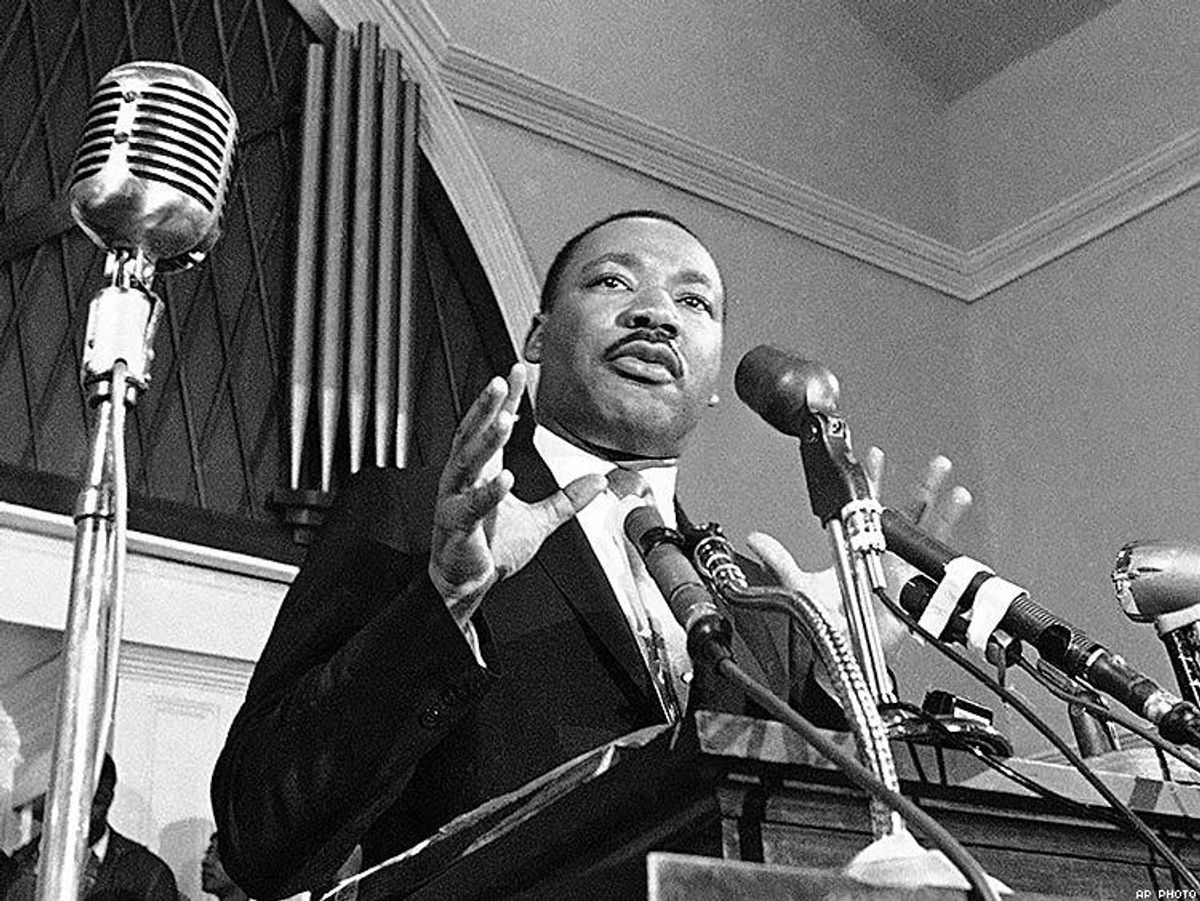
Martin Luther King Jr. was never given the opportunity to be an advocate for his LGBT brothers and sisters, writes Rev. Irene Monroe.
January 18 2016 6:01 AM EST
August 23 2016 5:09 AM EST
By continuing to use our site, you agree to our Private Policy and Terms of Use.

Martin Luther King Jr. was never given the opportunity to be an advocate for his LGBT brothers and sisters, writes Rev. Irene Monroe.
This Martin Luther King Jr. holiday reminds me how Alabama has always been a troubling state when it comes to upholding the civil rights of its denizens.
Martin Luther King, Jr.'s civil rights activism began in the unwelcoming "Heart of Dixie" in 1955 when on a cold December evening, Rosa Parks refused to relinquish her seat to a white passenger, birthing the Montgomery bus boycott. The boycott was the first of what would be many historic marches and protests that would catapult King onto a national stage. His acts of civil disobedience in the 1950s and 1960s helped elevate the country's moral consciousness as Alabama struggled with theirs. Sadly, in 2016, Alabama is still struggling.
When, on January 6, state Supreme Court Chief Justice Roy Moore ordered all probate judges to cease issuing marriage licenses to same-sex couples in spite of last June's historic U.S. Supreme Court ruling -- Obergefell v. Hodges -- that legalized same-sex marriage in all 50 states, I wasn't surprised. Rather, I was immediately reminded of Gov. George Wallace's 1963 famous inaugural speech when he unabashedly uttered, "Segregation now, segregation tomorrow, segregation forever!" in defiance of the high court's historic Brown v. Board of Education ruling upending this country's "separate but equal" doctrine, adopted in Plessy v. Ferguson.
When, on January 8, the Mobile County Probate Office resumed issuance of marriage licenses, I was asked by an editor, "What would be MLK's thoughts about the modern LGBTQ movement and the place of people of color in it?" As I comb through numerous books and essays learning more about King's philandering, his sexist attitude about women at home and in the movement, and his relationship with Bayard Rustin, I too wonder, Would King today be a public advocate for LGBTQ rights?
King's now-deceased wife would say yes.
In 1998, Coretta Scott King addressed the LGBT group Lambda Legal in Chicago. In her speech, she said LGBTQ equality and civil rights were the same.
"I appeal to everyone who believes in Martin Luther King's dream to make room at the table of brother and sisterhood for lesbian and gay people," she said.
Speculations on what King's views would be vary within African-American LGBTQ communities. But an overwhelming number in these communities look more to Bayard Rustin -- then and now -- than to King as a spokesman for supporting our civil rights.
"I tend not to worry much about what MLK would do. I tend to look at someone such as Bayard Rustin as one prime driving force in civil rights and other activism. Rustin was there before World War II. And he never wavered, always looking for something new. It was Rustin who schooled King in Gandhi's ideas. Rustin has simply said that the GLBT movement is the inheritor of civil rights activism in the U.S. I'll stick with Bayard," a blogger wrote me.
Sadly, Bayard Rustin, the gay man who was chief organizer and strategist for the 1963 March on Washington that further catapulted King onto the world stage, was not the beneficiary of King's dream.
In the civil rights movement, Rustin was always the man behind the scenes, and a large part of that had to due with the fact that he was gay. Because of their own homophobia, many African-American ministers involved in the civil rights movement would have nothing to do with Rustin, and they intentionally spread rumors that King was gay because of his close friendship with Rustin.
We must understand King within the historical context of the homophobic black church; because of his association with it, I cannot envision him endorsing marriage equality. But I, like so many within the African-American community -- straight or gay -- cannot fathom King marching against same-sex marriage as his youngest daughter, Rev. Bernice King, did.
On speculating about her father's viewpoint on marriage equality, Bernice said, "I know in my sanctified soul that he did not take a bullet for same-sex marriage," while standing at her father's gravesite in 2004 with thousands of protesters.
But is it fair to query whether King would have spoken out on LGBTQ justice when our civil rights movement had not even really begun?
King was assassinated over a year before the Stonewall riots. Gay rights had not reached the level of being a bona fide national issue yet, and for King to have made a major public pronouncement regarding LGBTQ rights would have been historically premature. Note the flak he took even for speaking out against the Vietnam War -- it was charged that he was overstepping his role and the war was not his issue.
If King were with us today, he would be 87 years old. And had he not by now evolved on the issue of marriage equality, I think the Alabama Supreme Court chief justice barring same-sex couples marriage licenses would remind him of the three Selma-to-Montgomery marches in 1965 when the state was a battleground in the fight for African-American citizens' constitutional right to vote.
"Had [King] lived long enough, he would have taken some form of enlightened viewpoint regarding gay/lesbian rights," a friend told me emphatically. "Personally, I speculate that probably he and his wife had private conversations regarding this issue, and I believe that Coretta's unwavering support of GLBT rights throughout the rest of her life reflects the direction of those discussions."
REV. IRENE MONROE is a writer, speaker, and theologian living in Cambridge, Mass.